Will Japan Finally Get a Cabinet That Makes Policy?
Will Japan Finally Get a Cabinet That Makes Policy?
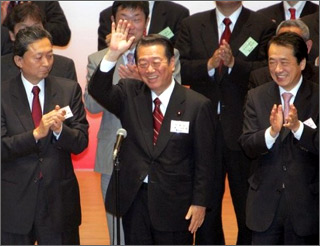
AMSTERDAM: To appreciate the potential for Japan's global role following from the first change in more than half a century of its ruling party, we must remind ourselves what that role has been up until now. Economically, Japan was, of course, formidable, dominating the globalized economy and seriously challenging entire industrial sectors in the United States and Europe. Also as a creditor nation, Japan gained an indirect but considerable political and strategic significance. But in the theater of strategic moves and diplomacy, there has been an odd vacancy that Japan could, and in many eyes should, have filled. The world has long become used to what at first was considered a great anomaly of the globe's second largest industrial power not being a global political presence.
The Minshuto (Democratic Party of Japan), which has just defeated the staid and internationally comatose LDP with 308 seats in Japan's lower house elections, intends to change this. Whether it can actually do so will depend on its ability to turn itself into a genuinely ‘ruling’ party, something that will require much political imagination, diplomatic wisdom for forging a cooperative relation-ship with Japan's bureaucrats, crucial support from the media and, probably, a lot of luck. Many Japanese and foreign commentators remain very skeptical.
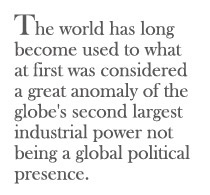
But it must be kept in mind that the core leadership of this party has wanted to do this for 16 years since their earlier failed attempt at creating a cabinet that functions like one and does not put signature stamps on what the top bureaucrats have compiled the day before. The fact is that no Japanese prime minister or any political faction hiding behind him or any council has so far constituted a forum to which other countries could turn. Even the Ministry of Finance, powerful body that it always has been, was not an effective substitute for an actual policymaking body of the central government, as Washington seemed to think for a while during the Clinton presidency.
Japanese politicians have since the 1960s been in the business of power broking rather than policymaking, which was left to groups of government bureaucrats. Hence, the new government must create suitable institutions to deal with domestic as well as international matters practically from scratch. The party has already begun setting up a ‘National Strategy Office’ as a policy coordinating center, which will be headed by Kan Naoto, one of Japan’s most capable politicians and a strong believer in accountable government.
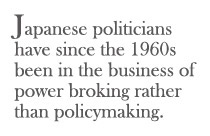
Rarely having experienced top-down political decision-making, Japan's political elites among the parties, and especially the bureaucracy, the media, and academia will have to get used to what without exaggeration may be called a revolutionary change in their environment. This will take some doing, and we must expect that for the first year domestic issues will receive most attention as the incumbents consolidate their position at home.
But if the Minshuto politicians are allowed to have their way, and can survive the near certain at-tempts by bureaucrats to bring them down through trumped up scandals (a favorite Japanese way to deal with strong-minded politicians), we may well get to know a different Japan on the international stage. This will happen at a time when regional circumstances appear more than ready for it.
Japan was able to build its economic miracle in the comfort of a strategic shelter. Besides providing military protection, the US also played the crucial role of ‘buyer of last resort’ to keep Japan's immense production machinery humming. Until the credit crisis struck last autumn. The abrupt discontinuation of American demand for Japanese industrial goods has been a big blow to a transpacific economic system that was already showing some signs of exhaustion.
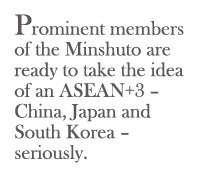
Because China gets all the attention when it comes to buying American debt, it has recently been forgotten that Japan is the biggest net lender to the United States (when we include the corporate sector). Until China emerged as the next biggest buyer of US Treasuries half a decade ago, Japan had provided the main pillar of support for the dollar. It was Japan that initially taught Washington the possibility of having ‘deficits without tears’. But the upward pressure on the yen is no longer something that Japanese business believes must be stopped at all costs. The fact that Japanese-owned dollars circulating in the American economy no longer guarantee American purchases in Japan has prompted a rethinking of priorities in the higher reaches of the Japanese business community.
The Minshuto wants to start other engines of economic growth besides the export sector. China is on the way to become Japan's number one trading partner, or has already done so, and the two countries have begun to work more closely together in other areas too, as in their agreement to promote a strengthening of Asian currency reserves. Prominent members of the Minshuto are ready to take the idea of an ASEAN+3 (China, Japan and South Korea) seriously. This plan for formalizing and deepening aspects of cooperation between the aforementioned nations stalled because of foot dragging in Tokyo. There are further prospects for better political relations with China; Yukio Hatoyama, the prime minister designate, has already made the symbolically important announcement that he will not be visiting the Yasukuni shrine (something that caused a significant crisis in Chinese-Japanese relations when Koizumi was Prime Minister).
Relations with Japan's largest neighbor, Russia, need urgent attention as well. Attempts to normalize and improve them stalled as a result of an LDP and Foreign Ministry addicted to the status quo. Given time, a Minshuto government may well be the agent for what the world has been expecting in the way of Japan playing a positive regional role.
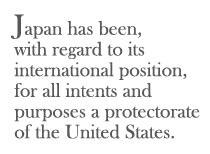
Should the previous hurdles be resolved, the DPJ will be able to fix its eyes on what is, in effect, Japan's most problematic international relationship: the United States. Its problems are not caused by any mutual hostility – the trade and industrial ‘frictions’ of a couple of decades ago or any recent deep disagreement. The problem is that the true nature of the relationship cannot be openly addressed. Japan has been, with regard to its international position, for all intents and purposes a protectorate of the United States.
Ever since Emperor Hirohito came to pay respects to General MacArthur in the latter's Tokyo headquarters, officials in charge of Japan’s foreign relations have made sure that Japan would, in the end, always accommodate American wishes. This has been true in relations toward the former Soviet Union, China, and whenever the implications were important enough for the United States to be bothered by any sign of Japanese independence.
Some Minshuto politicians, including the prime-minister-to-be Yukio Hatoyama, have emphasized the need for Japan to become less dependent on the United States, and work toward a more equal relationship. The new ruling-party has long disagreed with Japanese financial support for relocating an American military base in Okinawa, and for the move of 8000 marines to Guam. Washington, which has long taken Japan for granted as one of its major military bases, has already made clear that renegotiation of already reached agreements with the outgoing LDP government is out of the question. How this will be resolved is likely to be seen as a first international test of the Hatoyama government that takes office next week.